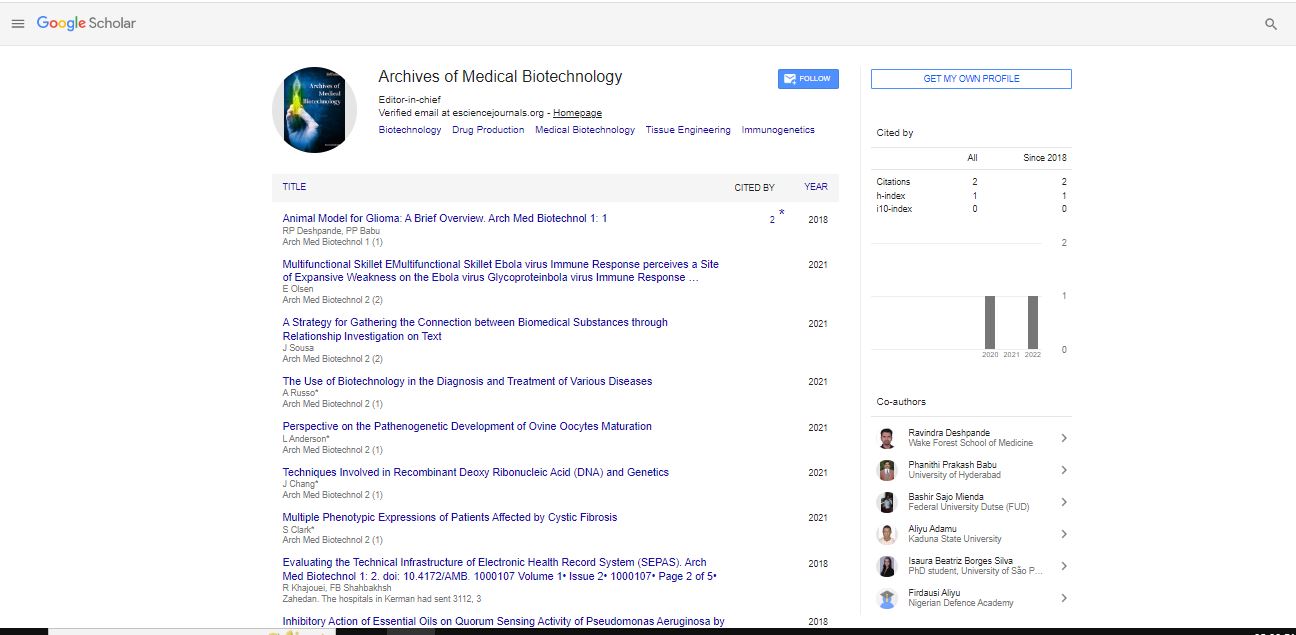Perspective, Arch Med Biotechnol Vol: 4 Issue: 1
Decoding the Human Genome: Insights into Biological Identity
Daniel Mariana*
1Department of Medical Biology and Genetics, Ahi Evran University, Ankara, Kırsehir, Turkey
*Corresponding Author: Daniel Mariana
Department of Medical Biology and
Genetics, Ahi Evran University, Ankara, Kırsehir, Turkey
E-mail: marianad67@gmail.com
Received date: 14 February, 2023, Manuscript No. AMB-23-95730;
Editor assigned date: 16 February, 2023, PreQC No. AMB-23-95730 (PQ);
Reviewed date: 03 March,2023, QC No. AMB-23-95730;
Revised date: 10 March, 2023, Manuscript No. AMB-23-95730 (R);
Published date: 20 March, 2023, DOI: 10.4172/amb.1000038.
Citation: Mariana D (2023) Decoding the Human Genome: Insights into Our Biological Identity. Arch Med Biotechnol 4:1.
Description
The human genome is the complete set of genetic instructions that determine an individual's biological traits, such as physical characteristics and susceptibility to certain diseases. In 2003, the Human Genome Project (HGP) completed the first draft of the human genome, revealing the sequence of approximately 3 billion base pairs that make up the DNA in a human cell. This milestone was a major achievement in the field of genomics, providing valuable insights into biological identity and opening up new avenues for medical research and personalized healthcare.
One of the most important outcomes of the HGP was the identification of genes and their functions. Genes are segments of DNA that contain the instructions for making specific proteins, which are the building blocks of the body. By identifying the location and function of genes within the human genome, researchers can better understand how the bodies work and why certain diseases develop. For example, mutations in the BRCA1 and BRCA2 genes have been linked to an increased risk of breast and ovarian cancer, leading to improved screening and prevention strategies for those at risk.
Another important outcome of the HGP was the development of new technologies for studying the genome. The HGP relied on a method called shotgun sequencing, which involves breaking the genome into small pieces, sequencing them, and then assembling them back together. Since then, new sequencing technologies have emerged that are faster, cheaper, and more accurate, making it possible to sequence entire genomes in a matter of hours or days. These advances have revolutionized medical research, allowing scientists to identify new disease-causing genes, develop more targeted therapies, and provide personalized treatment plans based on a patient's genetic profile.
Despite these advances, there are still many challenges to overcome in decoding the human genome. One major challenge is the fact that the genome is not a static entity, but rather a dynamic and complex system that is influenced by a wide range of environmental and lifestyle factors. For example, studies have shown that exposure to certain chemicals or pollutants can cause changes in gene expression that can lead to disease. Understanding the complex interactions between genes and the environment is important for developing effective prevention and treatment strategies for a wide range of health conditions.
Another challenge is the ethical and social implications of genetic information. While the ability to sequence the human genome has tremendous potential for improving healthcare, it also raises important ethical and social questions about privacy, discrimination, and access to care. For example, genetic information could be used to deny individuals insurance coverage or employment opportunities, leading to potential discrimination and inequality. Balancing the potential benefits and risks of genetic information is an ongoing challenge for policymakers, researchers, and healthcare providers.
Conclusion
In conclusion, the decoding of the human genome has been a major milestone in the field of genomics, providing valuable insights into the biological identity and paving the way for personalized healthcare and medical research. By identifying genes and their functions, researchers can better understand how the bodies work and why certain diseases develop, leading to improved prevention and treatment strategies. However, there are still many challenges to overcome in understanding the complex interactions between genes and the environment and addressing the ethical and social implications of genetic information. Continue to uncover the mysteries of the genome, it is important to consider the potential benefits and risks of this knowledge and ensure that it is used in a responsible and equitable manner.
 Spanish
Spanish  Chinese
Chinese  Russian
Russian  German
German  French
French  Japanese
Japanese  Portuguese
Portuguese  Hindi
Hindi 